Women in Hematology Webinar
Moderators
Dr. Tamara Dunn
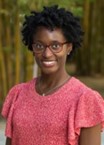 Dr. Tamara Dunn is a clinical associate professor in the Division of Hematology at the Stanford University School of Medicine. She is a clinician with a special interest in medical education, diversity, equity, and inclusion. Specifically, she is committed to improving workforce diversity and creating inclusive workplaces. She is currently the program director for the Stanford Hematology Fellowship and one of the associate chairs of diversity and inclusion for the Department of Medicine at Stanford. She is a member of the inaugural ASH Ambassador Cohort and part of the ASH Women in Hematology working group, where she served as co-chair in 2022 She also participated in the ASH Medical Educator’s Institute. Dr. Dunn takes pride in treating underserved veterans at the Palo Alto Veterans Hospital, where she sees both classical and malignant hematology patients. Outside of medicine she enjoys singing, dancing, sports (Go Chiefs! Go Warriors!), board games, movies, and spending time with friends and family including her 3 young children, spouse, and energetic vizsla Casey.
Dr. Tamara Dunn is a clinical associate professor in the Division of Hematology at the Stanford University School of Medicine. She is a clinician with a special interest in medical education, diversity, equity, and inclusion. Specifically, she is committed to improving workforce diversity and creating inclusive workplaces. She is currently the program director for the Stanford Hematology Fellowship and one of the associate chairs of diversity and inclusion for the Department of Medicine at Stanford. She is a member of the inaugural ASH Ambassador Cohort and part of the ASH Women in Hematology working group, where she served as co-chair in 2022 She also participated in the ASH Medical Educator’s Institute. Dr. Dunn takes pride in treating underserved veterans at the Palo Alto Veterans Hospital, where she sees both classical and malignant hematology patients. Outside of medicine she enjoys singing, dancing, sports (Go Chiefs! Go Warriors!), board games, movies, and spending time with friends and family including her 3 young children, spouse, and energetic vizsla Casey.
Dr. Ariela Marshall
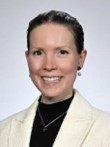 Dr. Ariela Marshall is a hematologist specializing in disorders of thrombosis and hemostasis (bleeding and clotting) in women. She is a graduate of Harvard Medical School and completed her residency in internal medicine at the University of Pennsylvania followed by a fellowship in hematology-oncology at Dana-Farber Cancer Institute/Massachusetts General Hospital. She worked at Mayo Clinic in Rochester, MN from 2015 to 2021 and in 2021 she joined the faculty at the University of Pennsylvania in Philadelphia where she is the director of the Women’s Thrombosis and Hemostasis program and associate professor of clinical medicine. Dr. Marshall is also a medical educator with a focus on career development, leadership, and mentorship and serves as the associate program director for the Hematology Fellowship at the University of Pennsylvania. She has a particular interest in gender equity in medicine and leads several advocacy initiatives and research projects to advance efforts in fertility/infertility awareness, parental health, and gender equity. Dr. Marshall co-chairs the WASH Women in Hematology working group and has multiple other local and national leadership positions; she also speaks regularly at national and international meetings on topics related to mentorship, gender equity, and women’s health.
Dr. Ariela Marshall is a hematologist specializing in disorders of thrombosis and hemostasis (bleeding and clotting) in women. She is a graduate of Harvard Medical School and completed her residency in internal medicine at the University of Pennsylvania followed by a fellowship in hematology-oncology at Dana-Farber Cancer Institute/Massachusetts General Hospital. She worked at Mayo Clinic in Rochester, MN from 2015 to 2021 and in 2021 she joined the faculty at the University of Pennsylvania in Philadelphia where she is the director of the Women’s Thrombosis and Hemostasis program and associate professor of clinical medicine. Dr. Marshall is also a medical educator with a focus on career development, leadership, and mentorship and serves as the associate program director for the Hematology Fellowship at the University of Pennsylvania. She has a particular interest in gender equity in medicine and leads several advocacy initiatives and research projects to advance efforts in fertility/infertility awareness, parental health, and gender equity. Dr. Marshall co-chairs the WASH Women in Hematology working group and has multiple other local and national leadership positions; she also speaks regularly at national and international meetings on topics related to mentorship, gender equity, and women’s health.
Speakers
Dr. Belinda Avalos
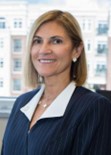 Dr. Belinda Avalos is a professor of medicine and a senior advisor to the president of Atrium Health Levine Cancer Institute, where she previously served as vice chair of the Department of Hematologic Oncology and Blood Disorders and director of the Transplant and Cellular Therapy Laboratory from 2012 to 2022. Dr. Avalos received her MD from The Ohio State University and performed fellowship training at the University of Washington, Ohio State, and UCLA.
Dr. Belinda Avalos is a professor of medicine and a senior advisor to the president of Atrium Health Levine Cancer Institute, where she previously served as vice chair of the Department of Hematologic Oncology and Blood Disorders and director of the Transplant and Cellular Therapy Laboratory from 2012 to 2022. Dr. Avalos received her MD from The Ohio State University and performed fellowship training at the University of Washington, Ohio State, and UCLA.
Dr. Avalos has a longstanding career as a basic researcher, clinician, teacher, and mentor. She has been a member of ASH since 1993 and served the Society in a range of capacities from the Scientific Committee on Hematopoiesis to the Committee on Government Affairs. She previously served as chair of the ASH Diversity, Equity, and Inclusion (DEI) Committee and as a councillor on the ASH Executive Committee. Under her leadership as chair of the DEI Committee, the ASH Ambassador Program was developed as well as new awards for minority residents, fellows, and graduate students. Dr. Avalos currently serves as Vice President of ASH, and will serve consecutive terms as President-Elect, and President through 2025. She is a member of the ASH Research Collaborative Executive Committee, ASH Finance Subcommittee, Women in Hematology Working Group, Health Equity Task Force, Mentorship Summit Working Group, and serves on the Blood Editorial Board.
As a distinguished physician-scientist, Dr. Avalos has made significant research contributions in the areas of leukemogenesis, congenital neutropenia, transplantation, and cellular therapy. She is devoted to building a diverse and inclusive hematology workforce and in serving the global hematology community.
Dr. Judith Gasson
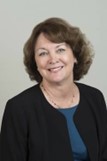 Dr. Judith Gasson has spent more than 35 years at UCLA in various teaching, research, and senior leadership roles. She currently serves as senior advisor at the David Gaffen School of Medicine for Research and Innovation, a role that she has held since November 2015, and as a board member of the UCLA Technology Development Corporation. In this capacity, she works with faculty inventors, business students and faculty, and the Office of Technology Development to facilitate the translation of innovative discoveries to address unmet medical needs. She also serves on the boards of the National Marrow Donor Program, California Institute for Regenerative Medicine, and the Jonsson Cancer Center Foundation.
Dr. Judith Gasson has spent more than 35 years at UCLA in various teaching, research, and senior leadership roles. She currently serves as senior advisor at the David Gaffen School of Medicine for Research and Innovation, a role that she has held since November 2015, and as a board member of the UCLA Technology Development Corporation. In this capacity, she works with faculty inventors, business students and faculty, and the Office of Technology Development to facilitate the translation of innovative discoveries to address unmet medical needs. She also serves on the boards of the National Marrow Donor Program, California Institute for Regenerative Medicine, and the Jonsson Cancer Center Foundation.
She served as the director of UCLA's Jonsson Comprehensive Cancer Center (JCCC) and president of the Jonsson Cancer Center Foundation from September 1995 until September 2015. JCCC is one of only 47 institutions designated as a comprehensive cancer center by the National Cancer Institute, and consistently rated among the nation’s top 10 institutions, according to U.S. News & World Report. Under her leadership, JCCC became an international pioneer in “translating” laboratory discoveries into more effective new therapies for cancer patients everywhere.
Dr. Gasson also served as senior associate dean for research at the David Geffen School of Medicine from September 2012 until she retired three years later. She began her career at UCLA in 1983 as a professor of medicine (Hematology-Oncology) and biological chemistry. Her work was instrumental in purifying for the first time a hormone-like substance that increases the speed of bone marrow cell reproduction. That substance called GM-CSF also had impacts on the granulocytes and monocytes of the immune system.
Her academic credentials include a BS degree in microbiology from Colorado State University and a Doctorate in Physiology from the University of Colorado. She did her post-doctorate work at the Salk Institute in La Jolla, studying glucocorticoid hormones.
Dr. Kellie Machlus
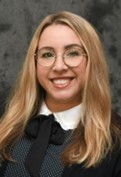 Dr. Kellie Machlus is an assistant professor at Boston Children’s Hospital and Harvard Medical School. She obtained her PhD at the University of North Carolina at Chapel Hill under the supervision of Dr. Alisa Wolberg, studying the pathophysiology of venous thromboembolism. She then did her postdoc with Dr. Joseph Italiano, studying megakaryocyte biology. The Machlus lab is focused on identifying molecular mechanisms of megakaryocyte development that lead to enhanced platelet production, with specific emphasis on how inflammation affects megakaryocyte function. In many inflammatory conditions, platelet counts rise acutely, resulting in thrombocytosis; what initiates this platelet up-regulation is not well understood. The Machlus lab uses inflammation as a model of exacerbated, TPO-independent hematopoiesis that results in differences in platelet quality and quantity to 1) gain a better understanding of the basic biology of megakaryocyte maturation and platelet production, 2) identify TPO-independent pathways of megakaryocyte maturation, and 3) determine ways to reduce platelet-related morbidity and mortality in inflammation. The goal of the Machlus lab is to identify TPO-independent pathways of megakaryocyte maturation that result in novel therapeutics to treat platelet disorders. Current lab projects are focused on using platelet extracellular vesicles and dietary lipids to enhance megakaryopoiesis and platelet production, and on studying the role of megakaryocytes in the pathogenesis of clonal hematopoiesis of indeterminate potential (CHIP)– mediated cardiovascular disease.
Dr. Kellie Machlus is an assistant professor at Boston Children’s Hospital and Harvard Medical School. She obtained her PhD at the University of North Carolina at Chapel Hill under the supervision of Dr. Alisa Wolberg, studying the pathophysiology of venous thromboembolism. She then did her postdoc with Dr. Joseph Italiano, studying megakaryocyte biology. The Machlus lab is focused on identifying molecular mechanisms of megakaryocyte development that lead to enhanced platelet production, with specific emphasis on how inflammation affects megakaryocyte function. In many inflammatory conditions, platelet counts rise acutely, resulting in thrombocytosis; what initiates this platelet up-regulation is not well understood. The Machlus lab uses inflammation as a model of exacerbated, TPO-independent hematopoiesis that results in differences in platelet quality and quantity to 1) gain a better understanding of the basic biology of megakaryocyte maturation and platelet production, 2) identify TPO-independent pathways of megakaryocyte maturation, and 3) determine ways to reduce platelet-related morbidity and mortality in inflammation. The goal of the Machlus lab is to identify TPO-independent pathways of megakaryocyte maturation that result in novel therapeutics to treat platelet disorders. Current lab projects are focused on using platelet extracellular vesicles and dietary lipids to enhance megakaryopoiesis and platelet production, and on studying the role of megakaryocytes in the pathogenesis of clonal hematopoiesis of indeterminate potential (CHIP)– mediated cardiovascular disease.
Dr. Alisa Wolberg
 Dr. Alisa Wolberg (BS ’91, PhD ’96) is a professor of pathology and laboratory medicine at the University of North Carolina at Chapel Hill. She currently chairs the ASH Committee on Scientific Affairs, and the National Institutes of Health/Hemostasis, Thrombosis, Blood Cells, and Transfusion study section. Dr. Wolberg previously served as associate editor for Research and Practice in Thrombosis and Haemostasis and is now an Associate Editor of Blood Advances. She chaired the 2018 Hemostasis GRC, was Scientific Co-chair for the 2020 ASH Annual Meeting and is vice chair of the HTRS 2023 meeting and basic science vice chair of the ISTH 2024 meeting. She also directs UNC’s T32 “Enhancement training for the next generation of translational Ph.D. scientists” and associated Graduate Training Program in Translational Medicine. Dr. Wolberg’s research laboratory studies contributions of fibrin(ogen), factor XIII, and red blood cells to thrombosis, mechanisms in cancer-associated thrombosis and hormone- associated thrombosis, and mechanisms that mediate clot formation and stability in hemophilia and factor XI deficiency.
Dr. Alisa Wolberg (BS ’91, PhD ’96) is a professor of pathology and laboratory medicine at the University of North Carolina at Chapel Hill. She currently chairs the ASH Committee on Scientific Affairs, and the National Institutes of Health/Hemostasis, Thrombosis, Blood Cells, and Transfusion study section. Dr. Wolberg previously served as associate editor for Research and Practice in Thrombosis and Haemostasis and is now an Associate Editor of Blood Advances. She chaired the 2018 Hemostasis GRC, was Scientific Co-chair for the 2020 ASH Annual Meeting and is vice chair of the HTRS 2023 meeting and basic science vice chair of the ISTH 2024 meeting. She also directs UNC’s T32 “Enhancement training for the next generation of translational Ph.D. scientists” and associated Graduate Training Program in Translational Medicine. Dr. Wolberg’s research laboratory studies contributions of fibrin(ogen), factor XIII, and red blood cells to thrombosis, mechanisms in cancer-associated thrombosis and hormone- associated thrombosis, and mechanisms that mediate clot formation and stability in hemophilia and factor XI deficiency.


